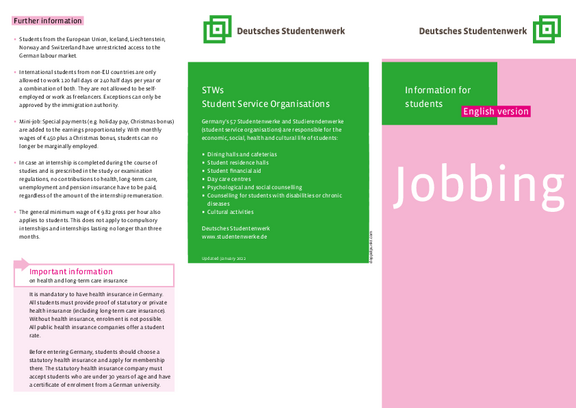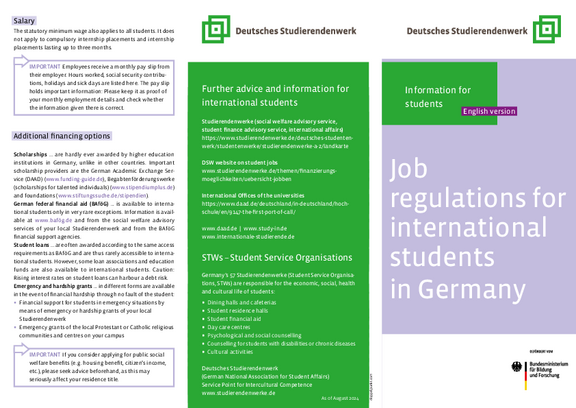TODO: Other financing options
Financing options
Studierende können zur Finanzierung ihrer Lebenshaltungskosten bzw. zur Überbrückung von Finanzierungslücken den flexiblen KfW-Studienkredit beantragen. Er steht sowohl BAföG-Empfänger*innen als auch Studierenden, die kein BAföG erhalten, zur Verfügung.
Weitere Informationen:
- Aktuelle Zins-Konditionen
- Umfassende Informationen zum KfW-Studienkredit
- Ansprech- und Vertriebspartner
TIPP: unsere Sozialberatung berät Sie gerne individuell dazu, ob der KfW-Studienkredit die richtige Lösung für Sie ist!
Die KfW-Bank spielt in der Bildungsfinanzierung eine wichtige Rolle: Im Auftrag des Bundes ist sie derzeit beim "verzinslichen Bankdarlehen im Rahmen des BAföG", beim "Bildungskreditprogramm des Bundes" und mit dem eigenen "KfW-Studienkredit" aktiv.
Auch private Kreditinstitute bieten eigene Kredite speziell für Studierende an.
Eine Übersicht finden Sie auf der Seite von studis-online.
Der Bildungskredit ist zeitlich befristet und zinsgünstig und steht sowohl BAföG-Empfänger*innen als auch Studierenden, die kein BAföG erhalten, zur Verfügung.
Voraussetzungen für den Bildungskredit:
- für Studierende in fortgeschrittenen Ausbildungsphasen (nach bestandener Zwischenprüfung oder gleichwertiges, also nicht für Studierende im Grundstudium), bei einem Bachelor-Studiengang reicht der Nachweis, dass die üblichen Leistungen des ersten Ausbildungsjahres erbracht wurden;
- das 36. Lebensjahr darf noch nicht überschritten sein;
- grundsätzlich nur bis zum Ende des 12. Studiensemesters.
The graduation loan (in Bavaria)
The Darlehenskasse der Bayerischen Studierendenwerke e. V. aims to make it easier for needy students at Bavarian universities to prepare for their exams and successfully complete their studies by granting graduation loans. Further information: Bavarian Loan Fund
The most important facts in a nutshell:
- Interest-free for up to 5 years, then only 2 percent interest per year
- Up to €700 per month and up to €18,000 in total
- Up to €3,000 possible without a security deposit
Independent and individual advice and application at the Studierendenwerk Würzburg
CHE-Studienkredit-Test 2024
Here you can find the current CHE student loan test (German PDF file) with a comparison of student loans, graduation loans and education funds
Child allowance is paid to anyone who is resident in Germany. International students can receive child benefit for their children if they have a valid settlement or residence permit (only certain types).
Child allowance is generally paid until the child reaches the age of 25 at the latest.
Child allowance amounts (since January 2023) to 250 euros for each child.
Child allowance is paid from the beginning of the month in which the eligibility requirements are met and until the end of the month in which the eligibility requirements cease to apply.
The written application must be submitted to the relevant family benefits office of the employment agency where the applicant is resident.
Free service hotlines for child allowance:
Tel.: (0800) 4 55 55 30 (Information)
und (0800) 4 55 55 33 (Payment dates for child allowance)
Internet: www.arbeitsagentur.de (Information on child allowance from 18)
Who is entitled to housing allowance?
e.g. students who
- have exceeded the age limit of 30 years at the beginning of their studies,
- have changed their education or field of study without a recognized reason,
- have exceeded the maximum funding period,
- are not eligible for BAföG as international students,
- have started a course that is not eligible for funding (e.g. second course),
- have not provided the required proof of performance according to § 48 BAföG
Further information
The application for housing allowance must be submitted to the responsible housing allowance office and will be paid from the month in which the application is submitted. The application must be accompanied by the following
- Notification from the BAföG office that you are entitled to BAföG on the merits, but are not entitled to BAföG for reasons of point 1. or 2.
- Certificate from the landlord/landlady stating the rent, size and first occupancy of the apartment,
- Proof of income (parents, income, loan, etc.),
- Proof of health insurance,
- Certificate of enrollment.
The Housing Office will issue a written decision on any housing allowance, which you can appeal against within four weeks if necessary. If the decision is positive, housing allowance is usually paid for 12 months. After 10 months, a new application should be submitted.
All information on housing allowances and the current housing allowance tables can be found on the website of the Federal Ministry of the Interior, Building and Community.
Links to the housing allowance offices:
The Studierendenwerk Würzburg provides free meal vouchers (so-called Freitischmarken) to students in need.
- Students who are experiencing temporary hardship through no fault of their own can receive these vouchers.
- They can receive 20 vouchers per semester for up to two semesters.
- Students who would like to receive the vouchers must request them in person at the offices of the social counselling service.
- The vouchers are provided by the Studierendenwerk on a voluntary basis. Students have no legal entitlement to them.
If you want to request free meal vouchers, you must hand in the following documents:
- the completed and signed request form; please download and print out the pdf file
- a copy of your current certificate of matriculation (Immatrikulationsbescheinigung)

